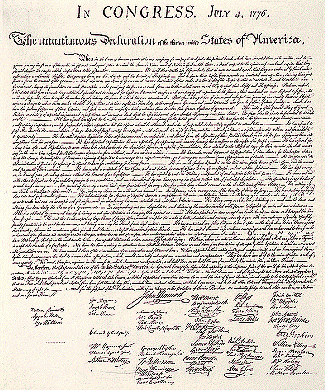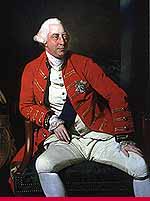High
Treason
The
most serious of all felonies was high treason, or treason against the King of
England. Eighteenth-century laws describe the four basic types of high treason:
1. "When
a man doth compass or imagine the death of our lord the king, of our lady
his queen, or of their eldest son and heir" [1].
2.
"If a man do violate the king's companion, or the king's eldest daughter unmarried,
or the wife of the king's eldest son and heir" [2].
This aspect pertains to carnal knowledge, forced or unforced, of a royal female.
The intention of this law is to guard the royal blood from any suspicion of
bastardy, whereby the succession to the crown might be rendered dubious [3].
It is important to note that in a monarchy, the transition of rule and the
reign of the monarch must be unquestioned, less civil unrest result.
3. "If a man
do levy war against our lord the king in his realm" [4].
4.
"If a man be adherent to the king's enemies in his realm, giving to them aid
and comfort in the realm, or elsewhere" [5].
This aspect of the treason law pertains to trading with enemy nations, as
well as trading with pirates. Many English colonies, including the American
colonies, trading openly with pirates because the merchants could avoid the
high English tariffs.
Since
High Treason was, and arguably remains, the most serious capital crime, testimony
of two witnesses to the same overt act was required to convict, and the punishment
in the Eighteenth century was severe. Blackstone states that "the punishment
of high treason in general is very solemn and terrible":
1.
That the offender be drawn to the gallows, and not be carried or walk: though
usually (by connivance length ripened by humanity into law) a sledge or hurdle
is allowed, to preserve the offender from the extreme torment of being dragged
on the ground or pavement 
2.
That he be hanged by the neck and then cut down alive
3. That
his entrails be taken out and burned, while he is yet alive
4.
That his head be cut off
5. That
his body be divided in four parts
6. That
his head and quarters be at the king's disposal [6].
The punishment did not end with the personal
suffering of the offender; the punishment extended to his or her family. The
law states that a person who is found guilty of treason must also undergo "forfeiture"
and "corruption of blood." In forfeiture, the person is forced to
give all their lands and property to the state. Corruption of blood prevents
the person's immediate family and hereditary heirs from owning property or conducting
business-- in effect ruining the offender's family forever.
But the punishment of treasonous women is similar,
yet different from men. "For as the decency due to the sex forbids the
exposing and publicly mangling their bodies, their sentence (which it to the
full as terrible to sensation as the other) is to be drawn to the gallows, and
there to be burned alive" [7].
Today,
the most famous offenders of the eighteenth-century English treason laws are
the American revolutionaries.  The Declaration of Independence violates the 3rd law of treason in this statement:
"And for the support of this Declaration, with a firm Reliance on the Protection
of divine Providence, we mutually pledge to each other out Lives, our Fortunes,
and our sacred Honor" [8].
When John Hancock, Samuel Adams, and other founding fathers signed this statement,
they did not sign some empty philosophical statement, they signed their death
warrant. This action displayed their dedication to the cause of American independence
and the ultimate disloyalty to King George the Third (below). Until the Declaration
of Independence, Washington, Jefferson, Adams and the others only disagreed
with Parliament, not the Crown; in fact, after a day of fighting the British
soldiers, Washington and his officers would toast the King before dinner.
The Declaration of Independence violates the 3rd law of treason in this statement:
"And for the support of this Declaration, with a firm Reliance on the Protection
of divine Providence, we mutually pledge to each other out Lives, our Fortunes,
and our sacred Honor" [8].
When John Hancock, Samuel Adams, and other founding fathers signed this statement,
they did not sign some empty philosophical statement, they signed their death
warrant. This action displayed their dedication to the cause of American independence
and the ultimate disloyalty to King George the Third (below). Until the Declaration
of Independence, Washington, Jefferson, Adams and the others only disagreed
with Parliament, not the Crown; in fact, after a day of fighting the British
soldiers, Washington and his officers would toast the King before dinner.  This
document is important because it marks the revolutionaries' acknowledgment that
the corruption of the English government was not contained within the Parliament,
but extended all the way up to the King; it marks the point of no return: either
the revolutionaries were going to gain their independence from England and create
a new country, or they were going to lose the war to the best army in the world,
forfeit everything they owned, ruin their families, and be drawn and quartered.
This
document is important because it marks the revolutionaries' acknowledgment that
the corruption of the English government was not contained within the Parliament,
but extended all the way up to the King; it marks the point of no return: either
the revolutionaries were going to gain their independence from England and create
a new country, or they were going to lose the war to the best army in the world,
forfeit everything they owned, ruin their families, and be drawn and quartered.
In
the Constitution, the framers changed English law. The corruption of blood and
forfeiture end after the offender dies, not down the hereditary line. The offender
may be put to death or jailed. There is no reference to a king because the United
States is a representative democracy. However, the framers retain the need for
the testimony of two witnesses to the same overt act. The Constitution asserts,
Treason against the United States, shall
consist only in levying war against them, or in adhering to their enemies,
giving them aid and comfort. No person shall be convicted of treason unless
on the testimony of two witnesses to the same overt act, or on the confession
in open court. The Congress shall have the power to declare the punishment
of treason, but no attainder of treason shall work corruption of blood, or
forfeiture except during the life of the person attained [9].
Even in the 21st century, treason remains the
highest crime, punishable by the highest penalty. Even in the state of Michigan,
where capital punishment is outlawed, a person who commits treason may be put
to death.






